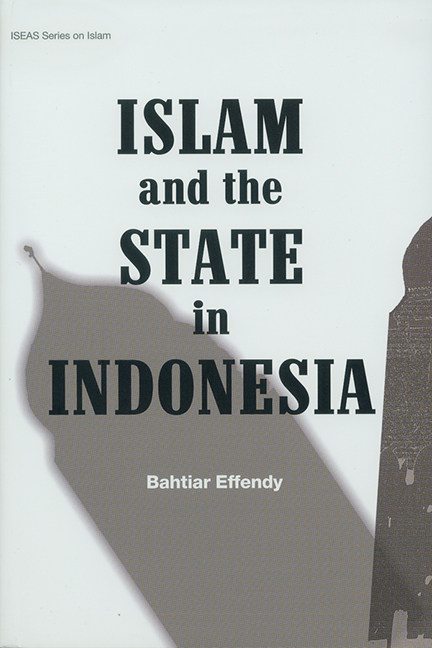Book contents
- Frontmatter
- Dedication
- Contents
- Abbreviations
- Acknowledgements
- Chapter 1 Introduction: The Problem of Political Relationship between Islam and the State
- Chapter 2 Explaining the Uneasy Relationship: Political Antagonism between Islam and the State in Indonesia
- Chapter 3 Emergence of the New Islamic Intellectualism: Three Schools of Thought
- Chapter 4 Implications of the New Islamic Intellectualism: Ideas and Practices
- Chapter 5 Beyond Parties and Parliament: Reassessing the Political Approach of Islam
- Chapter 6 Reducing Hostility: The Accommodative Responses of the State
- Chapter 7 Conclusion: Towards an Integrated Political Relationship between Islam and the State
- Chapter 8 Political Islam in Post-Soeharto Indonesia: A Postscript
- Bibliography
- Index
- About the Author
Chapter 6 - Reducing Hostility: The Accommodative Responses of the State
Published online by Cambridge University Press: 21 October 2015
- Frontmatter
- Dedication
- Contents
- Abbreviations
- Acknowledgements
- Chapter 1 Introduction: The Problem of Political Relationship between Islam and the State
- Chapter 2 Explaining the Uneasy Relationship: Political Antagonism between Islam and the State in Indonesia
- Chapter 3 Emergence of the New Islamic Intellectualism: Three Schools of Thought
- Chapter 4 Implications of the New Islamic Intellectualism: Ideas and Practices
- Chapter 5 Beyond Parties and Parliament: Reassessing the Political Approach of Islam
- Chapter 6 Reducing Hostility: The Accommodative Responses of the State
- Chapter 7 Conclusion: Towards an Integrated Political Relationship between Islam and the State
- Chapter 8 Political Islam in Post-Soeharto Indonesia: A Postscript
- Bibliography
- Index
- About the Author
Summary
To many observers, these moves amounted to what seemed an obvious gambit. The scenario makers spun out a logical subplot: Suharto needed to enlist Muslim political support in the run-up to elections. With opposition to his re-election to a sixth term in 1993 under the threat from an increasingly disillusioned military camp, Suharto appeared to be clutching at the only card left in his much diminished hand; he let it be known that when he died, he would like the Muslims to pray for him.
Michael R.J. VatikiotisIn themselves these events do not point to a decisive break with the policies of the early New Order. They can be dismissed as symbolic gestures. But if they are symbolic, they are not “merely” symbolic. Rather, they point to an ongoing and unstable dialectic in which changes in society — in particular, the growing influence of Islam in the urban middle class — have led some in government to look at Islam in new ways.
Robert W. HefnerACCOMMODATION BY THE STATE
As suggested in the preceding chapters, the idealism and activism of the earlier generation of political Muslims were characterized by formalism and legalism. The ultimate embodiment of their ideas and actions was their aspiration for the creation of an Islamic state, or a state based on Islamic ideology. Failure to accomplish this goal, partly due to the fact that not every Muslim shared the idea of Islamic statehood, led to an uneasy relationship between Islam and the Indonesian state.
The implications of this uneasy political relationship were far-reaching, culminating with shrinking access to the corridors of power and the declining stature of political Muslims, especially during the first twenty years of the New Order regime. Illustrative of the defeat of political Islam were the proscription of Masyumi (1960); the exclusion of its prominent figures in the leadership of the newly founded Parmusi (1968); the reduction of the number of Islamic political parties from four — Nahdlatul Ulama (NU), Muslimin Indonesia (MI), Partai Sarekat Islam Indonesia (PSII), and Persatuan Tarbiah Islam (Perti) — into a single Partai Persatuan Pembangunan (PPP) (1973); plummeting representation in the parliament as well as in the Cabinet; and the denial of Islam as the basis of Islamic social and political organization (1985). Most distressing, political Islam had become a convenient target of ideological distrust, suspected for its adherence to anti-state ideology.
- Type
- Chapter
- Information
- Islam and the State in Indonesia , pp. 149 - 192Publisher: ISEAS–Yusof Ishak InstitutePrint publication year: 2003

